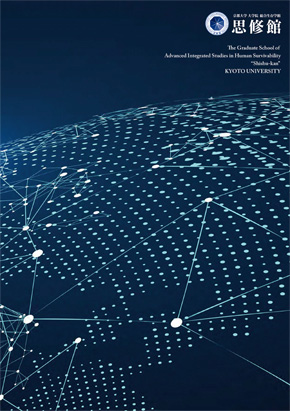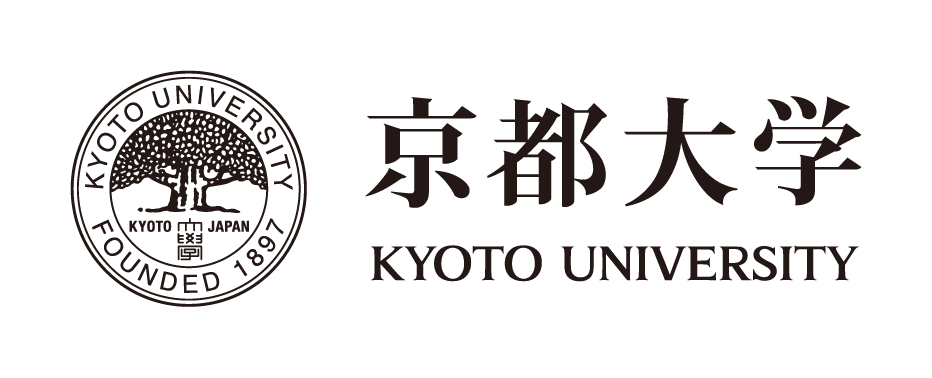Public Symposium on Food Security and Safety – Potentials of agricultural biotechnologies for the improvement of yields and quality of food
▲Members of hosting / supporting organizations and speakers
▼Explanation of photos from the left on the top,
・Opening remarks from FAO liaison office in Japan (FAO LOJ) Mbuli Charles Boliko (Director, Liaison Office in Japan, Food and Agriculture Organization of the United Nations)
・Key note speech Masami Takeuchi (Food Safety Officer, Agriculture and Consumer Protection Department, Food and Agriculture Organization of the United nations)
・Panel discussion
・Panel discussion
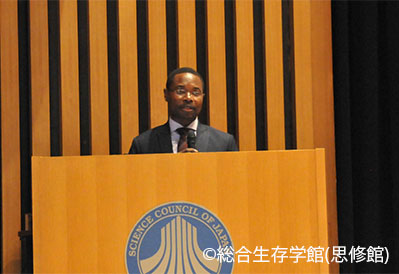
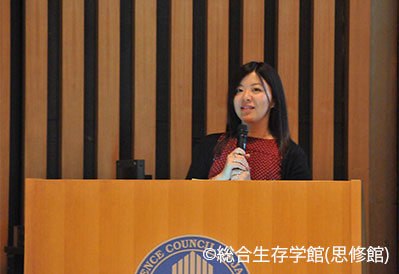
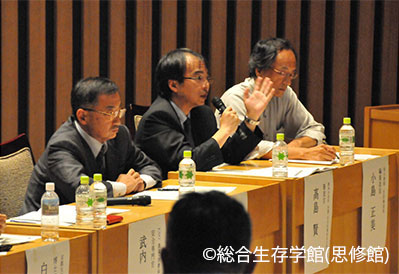
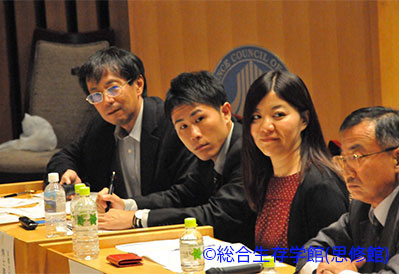
Public Symposium on Food Security and Safety – Potentials of agricultural biotechnologies for the improvement of yields and quality of food – was jointly organized by Subcommittee on Genetically Modified Crops, Science Council of Japan and Kyoto University in Tokyo on 9 October 2016.
Council for Biotechnology Information Japan (CBIJ) joined this event as a supporting organization.
Ryu Osugi (Executive member, Committee on Agriculture, Science Council of Japan) explained the background and objectives of the symposium in his opening remarks. He also introduced Science Council of Japan to the participants, saying that this is a representative organization of Japan for summarizing opinions from cultural/social/natural sciences and disseminating the relevant information both domestically and internationally. Next, Mbuli Charles Boliko (Director, Liaison Office in Japan, Food and Agriculture Organization of the United Nations (FLOJAO)) stated that FAO believes elimination of world hunger and malnutrition is possible for achieving the Sustainable Development Goals (SGDs) and works for it.
Masami Takeuchi (Food Safety Officer, Agriculture and Consumer Protection Department, Food and Agriculture Organization of the United nations (FAO)) explained that ‘food safety’ is one of the most important pillars to achieve ‘food security’ and all the foods including Genetically Modified (GM) foods need to be evaluated on their safety. She stressed that information sharing on the results of safety assessment is crucial for preventing food crisis, indirectly though. Yasufumi Imai (Director, Council for Biotechnology Information Japan) and Satoshi Takashima (Deputy Director General, Food Safety and Consumer Affairs Bureau, Ministry of Agriculture, Forestry and Fisheries (MAFF)) introduced the current status of GM crops and their related activities. Cultivation land for GM crops has been increasing and as of now it is estimated to be 180 million hectors. However, there are still many consumers who are worried about GM foods and thus, appropriate and sufficient communication and increase of social understanding need to be further addressed. Fumihiko Sato (Chair, Subcommittee on Genetically Modified Crops, Science Council of Japan) stated that Japanese plant science is at the world forefront, while applications of the research results have been limited to several spices. In order for Japan’s technology to be expanded in a global scale, it is hoped that field experiments of GM crops are actually conducted. Masami Kojima (Newspaper reporter, Mainichi shinbun) pointed out that social understanding on GM crops has not been improved. To end this current status, it is important for individuals and groups who have the common goals to cooperatively set concrete action goals for the improvement of social acceptance and make efforts on these goals. Kosuke Shiraishi (PhD student, Graduate School of Agriculture / Programme student, Graduate School of Advanced Leadership Studies, Kyoto University) kicked off the panel discussion by sharing his internship experience at FAO. He stated that Japan’s challenges on this topic are the internationalization of the relevant information and its dissemination. During the panel discussion, it was recognized that Japan’s system of safety assessment on GM crops are advanced. It was also acknowledged that developers are expected to make sustainable crops that are easily accessible and beneficial to consumers. Prof Sato (facilitator) concluded the panel discussion by saying that he would share the discussing points with the member of Science Council of Japan and discuss how science technology should be developed and how those technologies could be used by Japanese citizens.
As closing remarks, Shuichi Kawai (Dean, Graduate School of Advanced Integrated Studies in Human Survivability, Kyoto University) summarized discussions of the symposium and stated that he as a university professor would like to support researches on biotechnologies for the world’s sustainable development. To obtain big supports from society for the achievement, improvement of the understanding on technological developments in Japanese society and effective and sufficient communication need to be further addressed.
The program is shown below.
| 13:00-13:10 | House-keeping announcement |
| Kosuke Shiraishi (PhD student, Graduate School of Agriculture / Programme student, Graduate School of Advanced Leadership Studies, Kyoto University) | |
| 13:10-13:25 | Opening remarks |
| Ryu Osugi (Executive member, Committee on Agriculture, Science Council of Japan) | |
| 13:25-13:35 | Opening remarks from FAO liaison office in Japan (FAO LOJ) |
| Mbuli Charles Boliko (Director, Liaison Office in Japan, Food and Agriculture Organization of the United Nations) | |
| 13:35-14:05 | Key note speech |
| Agricultural biotechnologies for food security: Is our food enough and safe in 2050? | |
| Masami Takeuchi (Food Safety Officer, Agriculture and Consumer Protection Department, Food and Agriculture Organization of the United nations) | |
| 14:05-14:25 | Report on industries’ activities |
| Yasufumi Imai (Director, Council for Biotechnology Information Japan) | |
| 14:25-14:45 | Report on the governmental activities |
| Satoshi Takashima (Deputy Director General, Food Safety and Consumer Affairs Bureau, Ministry of Agriculture, Forestry and Fisheries) | |
| 14:45-15:05 | Report on academic activities |
| Fumihiko Sato (Chair, Subcommittee on Genetically Modified Crops, Science Council of Japan) | |
| 15:05-15:25 | Report on consumers’ activities |
| Masami Kojima (Newspaper reporter, Mainichi shinbun) | |
| 15:25-15:50 | Questions |
| 15:50-16:10 | Break |
| 16:10-17:10 | Panel discussion |
| · Japan’s challenges and social understanding towards GMOs | |
| · Contribution of Japan’s science technology including new plant breeding techniques to the global food supplies | |
| Facilitator: Sato | |
| Panelists: Takeuchi, Imai, Takashima, Kojima | |
| Youth commentator: Shiraishi | |
| 17:10-17:20 | Closing remarks |
| Shuichi Kawai (Dean, Graduate School of Advanced Integrated Studies in Human Survivability, Kyoto University) |
Symposium secretariats
Kyoto University
Yosuke Yamashiki(Prof, GSAIS)・Kosuke Shiraishi(PhD student, GSA / Programme student, GSALS)
Email shiraishi.kosuke.57x*st.kyoto-u.ac.jp (Please replace the * with @)
HP for announcement https://www.gsais.kyoto-u.ac.jp/blog/2016/07/13/20161009
HP for report https://www.gsais.kyoto-u.ac.jp/blog/2016/10/14/20161009_report


